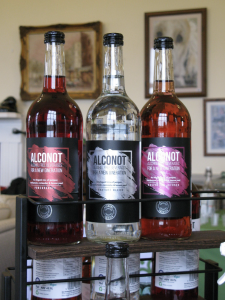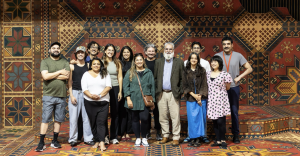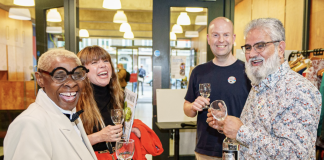When Balal Ahmed talks about why he launched an alcohol-free gin, the story doesn’t begin in a laboratory or a boardroom. It begins in a corner.
“For the best part of 40 years, I was the only one not drinking,” he told Asian Standard. “After three, four, five hours, you’re left with an orange juice or sparkling water. It can be a lonely space.”
That sense of isolation stayed with him across decades of corporate life. Born in Gujranwala, Pakistan, Ahmed moved to Rochdale with his family in 1968 at the age of six. He studied at Newcastle Polytechnic, now Northumbria University, before embarking on a 40-year career with major companies including ICI, Courtaulds, IBM and Deloitte. Work took him across every continent except South America, but wherever he went, business culture revolved around alcohol.
“It’s getting better,” he reflects, “but it is not there yet. We want to push ahead with the message of inclusivity.”
Faith at the centre
Ahmed is clear that his faith is central to everything he does. “No halal certification meant no business, no drinks,” he says firmly. “I could not face God if I were selling alcohol. That was our first goal as a family.”
He recalls the moment certification came through. “Getting the halal certificate was the biggest milestone. Without it there would have been nothing. I am a great believer in God, and I needed to know we were on the right side.”
For him, the religious dimension is inseparable from the company. “There’s a part of every Muslim that wonders what that tastes like,” he says. “Now there’s a way to enjoy the occasion without the alcohol.”
For Ahmed, the point was not just technical certification but trust. “No one should have to think twice before picking up our bottle; they should know it’s vegan and halal,” he says.

A family idea
The idea for what became United Beverages took shape in 2018, when Ahmed’s daughters, now his fellow co-founders, pressed him to consider starting a business. “I needed to be convinced we were doing something not just for profit, but for wellbeing,” he says.
They ruled out mocktails and ice-cream parlours. “Mocktails are just sugar bombs. They’re not an art,” Ahmed insists. Instead, the family began experimenting in the kitchen, raiding the spice cupboard coriander, cardamom, cloves, and citrus to create a spirit-style drink.
“We didn’t know what gin tastes like, so it had to taste good to us,” he recalls. The trials eventually produced a recipe with a slight sweetness designed to appeal to South Asian palates, balanced by tonic’s bitterness.
Family involvement has remained constant. “I’m a husband to a brilliant life partner, the same woman who has had to put up with me for decades,” Ahmed told Asian Standard. Together, they raised three daughters, “very independent ladies who developed the drinks along with their mum, while I was the tester.” He is now also grandfather to “a very focussed young lady of three and a full-of-life, inquisitive little boy of 13 months.”
Low sugar, low stigma
Though Ahmed lives with diabetes, he says health wasn’t the driving factor. “To be honest, my health had no part in the development. At the same time, it was not coincidental that we came up with a low sugar, low salt, low calorie drink.”
He contrasts his approach with mainstream brands. “So many Asian drinks are littered with E-numbers and sweeteners that will continue to be scrutinised for their effects on human health. We never wanted anything artificial. Our recipe development partner only sourced the best natural, ethical ingredients.”
The result is a drink that is halal, vegan, sugar-free and designed to be inclusive. “We wanted no one to have an excuse not to drink our drinks,” Ahmed says. “Inclusive by default, inclusive at its core.”
The 0.5% debate
Some critics still question whether drinks at 0.5% ABV or below can truly be described as alcohol-free. Ahmed has a ready answer.
“Our real ABV is around 0.07 to 0.08. We label at 0.1% to cover natural variation,” he explains. “Bread, grape juice and even bananas can contain more than that.”
What does “alcohol-free” mean?
UK rules allow drinks up to 0.5% ABV to be described as alcohol-free. Everyday foods such as ripe fruit, bread and vinegar naturally contain trace levels of alcohol. Religious guidance varies, but Ahmed points to his halal certification: “If anyone has questions, our certifying sheikh told me to refer them back to him.”
Milestones and pride
Beyond certification, Ahmed lists his proudest moments: the first lab reports, the first filled bottles, and the awards that followed. “Like a proud father,” he says.
This year United Beverages won the Best Ethical Drinks Trophy at the World Alcohol Free Awards, on top of a Gold Medal in April and a commended medal in 2024. “I nearly blew the house down when we won,” he said.

Looking ahead
The company launched at a Liverpool gin festival in 2023, a bold choice for an alcohol-free brand but one that delivered “99% positive feedback.” Leeds Playhouse now stocks the range, and Ahmed and his daughters are in talks with restaurants and venues across West Yorkshire.
Longer term, their ambition is cultural as much as commercial. “For drinkers of any background, we’ve created an off-ramp from alcohol as a way to take control, push back, and still enjoy the drink on any occasion.”
He adds, “I want alcohol-free options in every bar. That would be the real measure of success.”
For the man who once stood alone with an orange juice, this is more than a business. It is, in every sense, a family and a faith-driven mission.




